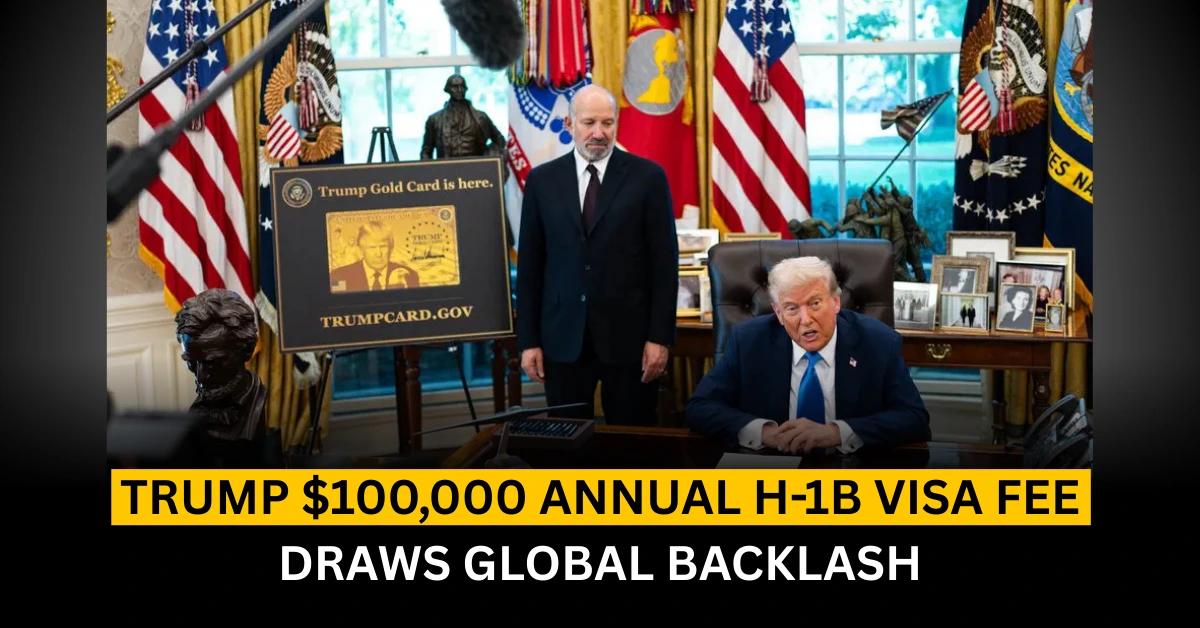The U.S. government under President Donald Trump has announced a $100,000 annual H-1B Visa Fee on all new H-1B petitions, effective from September 21, 2025, to September 21, 2026. The administration argues that the H-1B Visa Fee will help protect American jobs, discourage the replacement of U.S. workers, and push companies to train domestic talent.
Importantly, the new rule does not affect existing H-1B holders or renewals, but applies only to new applications, including the upcoming visa lottery. A national interest waiver is included for critical roles, especially in healthcare, where worker shortages remain a major concern.
Global Impact of the H-1B Visa Fee
The announcement has caused immediate disruption in both the U.S. and international markets.
- India, whose nationals account for 71% of H-1B recipients, condemned the H-1B Visa Fee as an “anti-talent policy”, warning it would block global mobility for skilled workers.
- Tech sector leaders, including Microsoft, Amazon, and JPMorgan, urged H-1B employees to avoid international travel, fearing re-entry problems without paying the new visa fee.
- Startups criticized the decision, warning that the H-1B Visa Fee would stifle innovation, reduce competitiveness, and drive talent toward countries like Canada and the UK.
- The healthcare sector expressed concern about shortages in specialized roles that depend on foreign expertise.
Also Read
Saudi Arabia and Pakistan Sign Landmark Strategic Mutual Defense Agreement
Legal and Economic Outlook
Economists remain divided on whether the H-1B Visa Fee will benefit U.S. workers. Some argue it may open opportunities for Americans in high-skilled jobs, while others warn it could accelerate outsourcing and reduce U.S. competitiveness. Immigration experts also expect legal challenges, questioning whether the administration can impose such a steep visa fee without Congress.
Meanwhile, highly skilled workers are exploring alternatives such as the O-1 “Einstein Visa”, while corporations prepare for increased costs and disruptions in hiring.
Key Details of the H-1B Visa Fee Policy
| Aspect | Details |
|---|---|
| Announcement Date | September 19, 2025 |
| Effective Period | September 21, 2025 – September 21, 2026 |
| Fee Amount | $100,000 annual H-1B Visa Fee, employer-paid |
| Applicability | Only on new H-1B petitions, including the next visa lottery |
| Exemptions | Existing holders and renewals exempt |
| Waivers | National interest waiver for critical roles (e.g., healthcare) |
| Policy Objective | Protect U.S. jobs, discourage worker replacement, train Americans |
| India’s Share (2024) | 71% of H-1B visas issued |
| Sectoral Impact | Tech and healthcare sectors most affected |
| Corporate Advisory | Microsoft, Amazon, JPMorgan warned staff to avoid international travel |
| Startups’ Response | Criticism: H-1B Visa Fee will harm innovation and recruitment |
| Global Criticism | India condemned it as an “anti-talent policy” |
| Alternative Visas | O-1 “Einstein Visa” suggested for top talent |
| Legal Outlook | Court challenges expected in the U.S. |
| Competitiveness Concerns | Risk of outsourcing and talent drain |
Join our WhatsApp channel. For more related news,
Conclusion
The introduction of a $100,000 H-1B Visa Fee has become one of the most controversial immigration policies in recent years. While the administration frames it as a way to safeguard U.S. jobs, critics argue it will weaken innovation, drive away talent, and damage America’s reputation as a global tech hub. With lawsuits likely, the true future of the H-1B Visa Fee will be decided in both courts and markets.




Join The Discussion